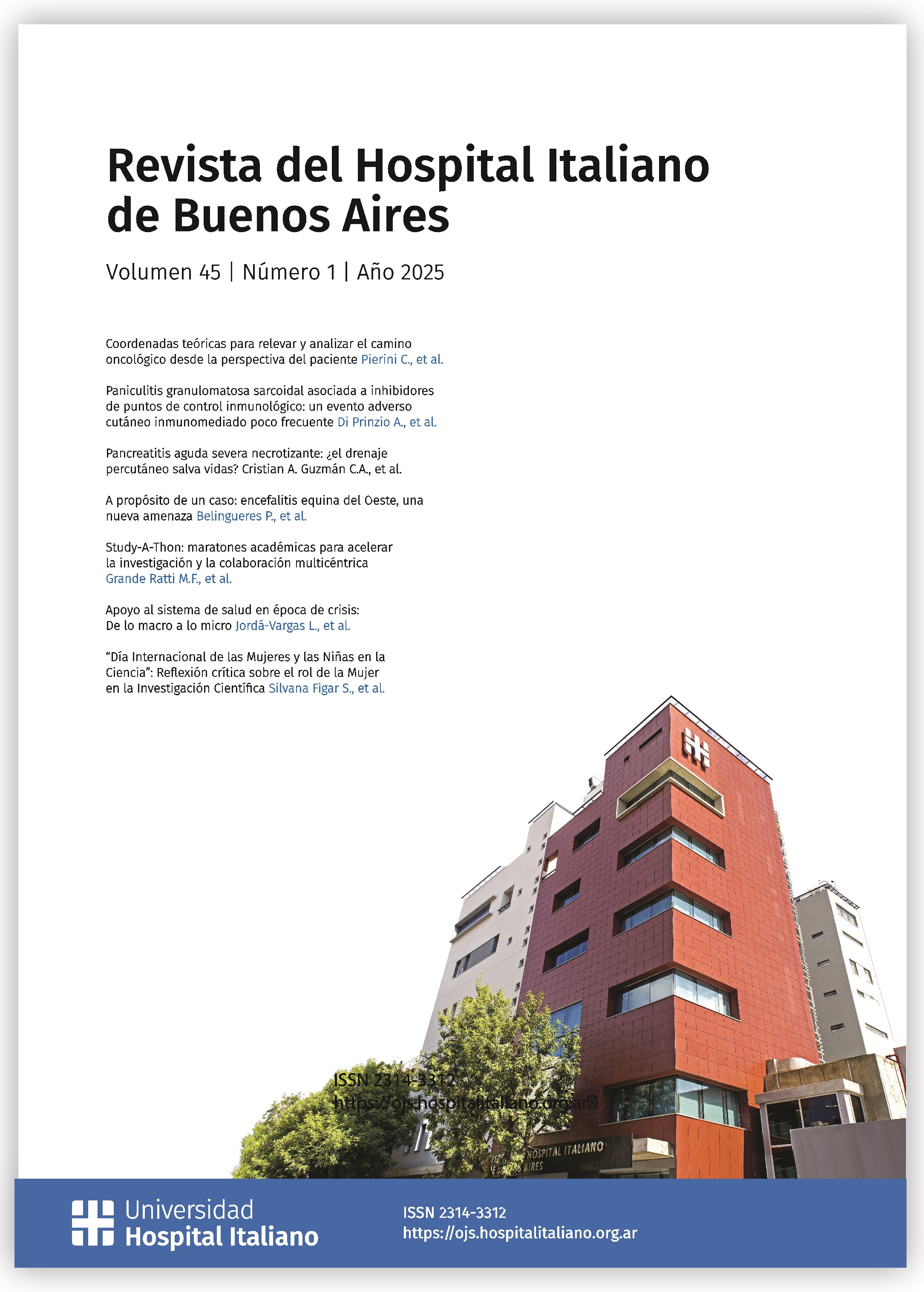International Day of Women and Girls in Science: A Critical Reflection on the Role of Women in Scientific Research
Main Article Content
Abstract
In our institution, women represent 58% of those engaged in science—a significant figure but still lower than their participation in healthcare roles (64%-81%). The contributions of women scientists, aligned with qualities described in the literature, have transformed work and leadership dynamics toward more inclusive and less hierarchical approaches. This shift is evident in the coexistence of traditional disease-focused research and a more humanistic, systemic, and transversal approach centered on health construction. The latter, predominantly biocentric and aligned with the Agenda 2030 goals, stands out for integrating a care perspective and other qualities culturally associated with women. Despite progress, women scientists face significant barriers: explicit and implicit gender biases that limit their access to funding and visibility, a dual burden of professional and domestic responsibilities, and a lack of support networks and mentors. These challenges underscore the need for institutional policies that promote equity, not only in resources but also in hierarchical roles. To this end, men must reflect on their gender privileges as cultural determinants. In this context, the International Day of Women and Girls in Science serves as an opportunity to celebrate their achievements, reflect on persistent barriers, and move toward a heterarchy that enables the development of science committed to the sustainability of life in a world increasingly shaped by the “artificial”.
Downloads
Article Details
Section

This work is licensed under a Creative Commons Attribution-NonCommercial-ShareAlike 4.0 International License.
How to Cite
References
Sarthou NF. Instrumentos para la promoción de la participación de la mujer en la ciencia: los premios L’Oréal-UNESCO en Argentina. Desafíos. 2019; 31(1):83-120. DOI: https://doi.org/10.12804/revistas.urosario.edu.co/desafios/a.6722
Porto MP. Mirrors of whiteness: media, middle-class resentment, and the rise of the far right in Brazil. Pittsburgh, PA: University of Pittsburgh Press; 2023. DOI: https://doi.org/10.2307/jj.8500737
Bourdieu P. Homo academicus. Madrid: Siglo XXI; 2008.
Sirinelli J-F, Bourdieu P, Aron J-P. Homo academicus. Vingtieme Siecle 1985; 175. DOI: https://doi.org/10.2307/3769946
Beauvoir D. El segundo sexo. Buenos Aires: Siglo Veinte; 1949.
Galtung J. Violence, peace, and peace research. J Peace Res. 1969;6(3):167-191. DOI: https://doi.org/10.1177/002234336900600301
Figar BS. Condicionantes en el proceso de institucionalización de la participación ciudadana en un programa de salud del área metropolitana de Buenos Aires: "Red Pública de Salud AMBA” 2018-2019 [tesis de doctorado]. Buenos Aires: FLACSO; 2023 [citado 2025 ene 10]. Disponible en: https://repositorio.flacsoandes.edu.ec/handle/10469/20724.
Perlo CL, López Romorini MV. Aprendizaje colectivo y concepciones del poder: entre la opresión y la potencia para producir cambios organizativos. Hallazgos. 2011;8(16):133-151. http://hdl.handle.net/2133/3837. DOI: https://doi.org/10.15332/s1794-3841.2011.0016.09
Foucault M. Vigilar y castigar: nacimiento de la prisión. México: Siglo XXI; 1975.
Perlo CL. Diálogo entre la cultura patriarcal-antropocéntrica y cultura matríztica-biocéntrica en los contextos organizativos. Rev Esc Cienc Educ. 2020;2(15):10-22. https://doi.org/10.35305/rece.v2i15.542. DOI: https://doi.org/10.35305/rece.v2i15.542
Vargas CM. El género como determinante social de la salud y su impacto en el desarrollo sostenible. UNIVERSITAS Rev Filosofía Derecho Pol. 2023;(41):33-47. https://doi.org/10.20318/universitas.2023.7412. DOI: https://doi.org/10.20318/universitas.2023.7412
Pagotto VL, Giunta DH, Dawidowski AR. Enfoque de género en las residencias médicas de un hospital universitario. Medicina (B Aires). 2020;80(3):219-228.
Ferloni A, Varela MMP, Acosta GA, et al. Consultorio de salud ambiental en un hospital privado de comunidad de la ciudad de Buenos Aires. Rev Hosp Ital B.Aires. 2022;42(3):152-157. https://doi.org/10.51987/revhospitalbaires.v42i3.213. DOI: https://doi.org/10.51987/revhospitalbaires.v42i3.213
Roni C, Fernández Cedro MI, Nuñez Lodwick L, et al. Género en carreras de medicina: la mirada de las autoridades universitarias. Educ Humanismo. 2024;27(48):1-20. https://doi.org/10.17081/eduhum.27.48.7003 DOI: https://doi.org/10.17081/eduhum.27.48.7003
Discacciati VR, Epstein DS, Iñurrategui MC, et al. Reflexión del trabajo médico asistencial en una comunidad WICHI con metodología fotovoz. Rev Hosp Ital B.Aires. 2024;44(3):e0000311. https://doi.org/10.51987/rev.hosp.ital.b.aires.v44i3.311. DOI: https://doi.org/10.51987/rev.hosp.ital.b.aires.v44i3.311
Güelman M, Ramírez R, Azparren AL, et al. Accesibilidad a la salud en personas en situación de calle de la Ciudad de Buenos Aires en contexto de pandemia por COVID-19: el rol de los dispositivos comunitarios y de los/as acompañantes pares. Cuestión Urbana. 2023;7(13):125-138.
Figar SB, Ferloni A, Hough GE, et al. Condicionantes de la presencia de glifosato en orina en poblaciones de zonas agroindustriales de la provincia de Buenos Aires, Argentina. Rev Hosp Ital B.Aires. 2024;44(2):e0000338. https://doi.org/10.51987/revhospitalbaires.v44i2.338. DOI: https://doi.org/10.51987/revhospitalbaires.v44i2.338
Kopitowski K. “Desimplementar” las prácticas de bajo valor: un imperativo ético. Rev Hosp Ital B.Aires. 2022;42(4):196-197. https://doi.org/10.51987/revhospitalbaires.v42i4.228. DOI: https://doi.org/10.51987/revhospitalbaires.v42i4.228
Posadas-Martínez ML, Vicens J, Dawidowski AR, et al. The role of registries in improving health and bridging healthcare, research, education, innovation and development: a research department perspective. J Int Med Res. 2024;52(3):3000605241233140. https://doi.org/10.1177/03000605241233140. DOI: https://doi.org/10.1177/03000605241233140
Reboiras FI, Mur JA, Deza R, et al. Maltrato en las residencias médicas: un estudio cualitativo sobre la configuración de las identidades profesionales. Investig Educ Méd. 2024;13(50):17-25. https://doi.org/10.22201/fm.20075057e.2024.50.23552. DOI: https://doi.org/10.22201/fm.20075057e.2024.50.23552

